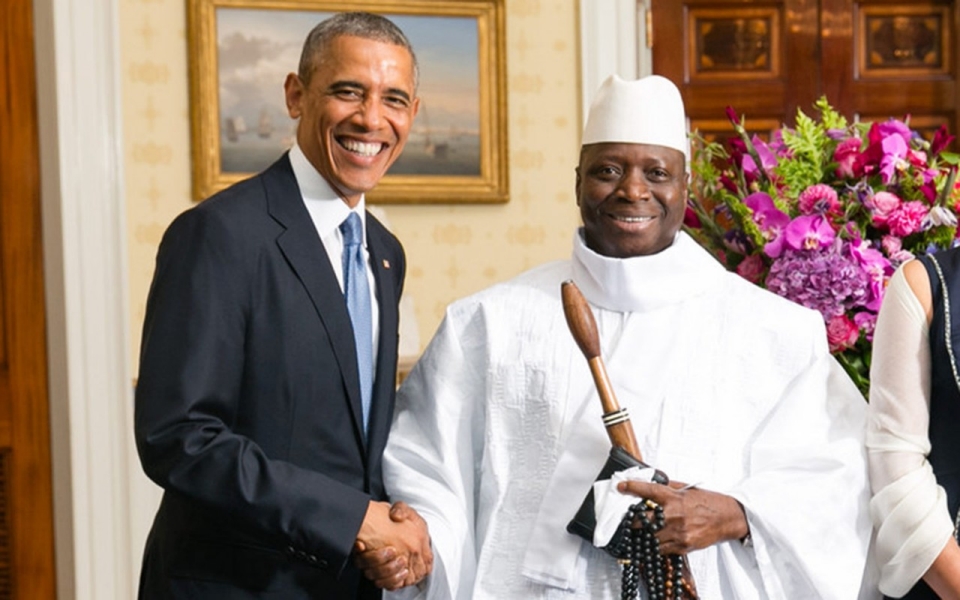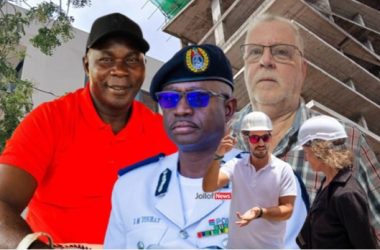
(JollofNews) – The United States Government of President Barack Hussein Obama has again severely criticised the APRC regime of President Yahya Jammeh over its treatment and lack of respect for the rights and liberties of Gambians.
In its 2015 annual Human Rights and Labour Report released on Wednesday, the Obama Administration said over the past year, the Jammeh regime has committed many human rights abuses with impunity including enforced disappearances, arrest and torture thereby creating a more restrictive environment for Gambians in the country including journalists and government critics.
Like in the previous years, the report said although the Gambian constitution and laws prohibits torture and other cruel, inhuman, or degrading treatment or punishment, there were reports that security forces tortured, beat, and mistreated persons in state custody.
It cited a 2014 report by the UN special rapporteurs on human rights, which stated that the officers of the feared National Intelligence Agency (NIA) and the police consistently practiced torture including severe beatings, electric shock, asphyxiation, and burning on individuals suspected of common crimes.
The Obama Administration said the Indemnity Act, which allows President Jammeh to grant amnesty to any person, including security force members, accused of misconduct during unauthorised gatherings, continued to deter victims from seeking redress for torture during the country’s 1994-96 military rule.
Prison And Detention Centre Conditions
With regards to the conditions in Gambian prisons and detention centres, the US government said over the past years conditions at detention places were harsh and life-threatening.
It added: “Prison conditions were poor and cells were overcrowded, damp, and poorly ventilated. Inmates complained of poor sanitation and food. Inmates occasionally slept on the floor. Former inmates and human rights non-governmental organisations (NGOs) reported that the prisoner mortality rate was high. Reports indicated that prisoners died of neglect or lack of access to healthcare. Water supply was adequate, but lighting in some cells was poor. During the summer temperatures were extremely high, and there were no ceiling fans or other measures to reduce heat. Authorities at the NIA held most detainees in solitary confinement and often in dark and rat and insect-infested rooms. Former detainees have described the poor sanitary conditions.”
Treatment Of Detainees
The Obama Administration said the Gambian security services is corrupt and ineffective and operates with impunity. It added that while Gambian law requires authorities to obtain a warrant before arresting a person, police officers often arrested individuals without a warrant and detain them beyond the constitutional 72- hours without charge or informing detainees promptly of charges against them.
It noted that although there was a functioning bail system in the country, prosecutors customarily opposed applications for bail for detainees charged with misdemeanours and ordered lengthy adjournments to allow additional time to prepare their cases.
It added that judges and magistrates sometimes set bail bonds at unreasonably high amounts and some offenders who are released on bail by the courts often gets rearrested by police or other law enforcement personnel as they leave the courts to provide the prosecution more time to prepare cases.

It said over the past year, officials did not allow detainees prompt access to a lawyer or family members and the government has failed to repeal military decrees enacted prior to the adoption of the constitution which give the NIA and the interior minister broad powers to detain individuals indefinitely without charge “in the interest of national security.”
Denial Of Fair Public Trial
The Obama Administration further added that although the Gambian constitution provides for an independent judiciary; courts in the tiny West African state lacked independence and were inefficient and corrupt. It added that President Jammeh’s power to remove judges has impeded judicial independence in the country and judges presiding over “sensitive” cases who made decisions not considered favourable to the government risked being fired.
The report said frequent delays and missing or unavailable witnesses, judges, and lawyers have created backlogs and inefficiency in the justice system resulting in lengthy pre-trial detention.
Political Prisoners
During the past year, the US government said there were credible reports that the Jammeh regime held civilians based on their political views or associations, and some were held incommunicado for prolonged periods.
Freedom Of Speech And The Media
The Obama Administration said while the constitution and law provide for freedom of speech and press; the Jammeh regime restricted these rights and the environment for independent and opposition media remained hostile, with numerous obstacles to freedom of expression, including administrative hurdles, arbitrary arrest and detention, intimidation and judicial harassment against journalists, and the closure of media outlets, leading to self-censorship.
According to the report, the APRC regime continues to harass and detain journalists, while numerous journalists remained in self-imposed exile due to government threats and harassment.
It added that individuals who publicly or privately criticised the government or the president risked government reprisal and the government routinely denied journalists from news outlets perceived to be critical of the government to access public information and excluded them from covering official events at certain venues.
“Private media outlets generally practiced self-censorship for fear of reprisal by the government, and many refrained from publishing content deemed contrary to the principles of Islam or offensive to other religions and sects,” the Obama Administration added.
It stated that while there were few government restrictions on access to the internet reports have it that the government of Yahya Jammeh continues to monitored e-mail or internet chat rooms without judicial oversight.
Civil Liberties
The United State government said although the constitution and law provide for freedom of assembly; Gambian police systematically refused requests for permission to hold demonstrations, even peaceful ones, and occasionally refused to issue permits to opposition parties wishing to hold political rallies.
It added that the government imposed restrictions on foreign travel for many persons released from detention, often because their travel documents were confiscated temporarily at the time of their arrest or soon afterwards.
It added that as a rule, the government required all its employees to obtain permission from the Office of the President before travelling abroad.






Gambians are tired of dictatorship. Jammeh must step down